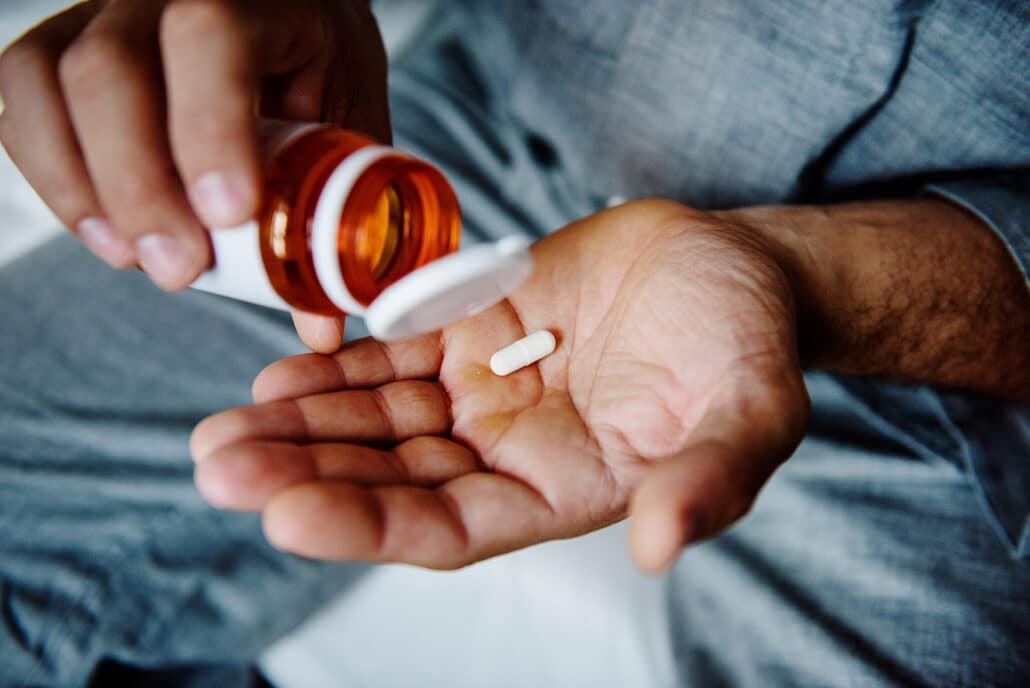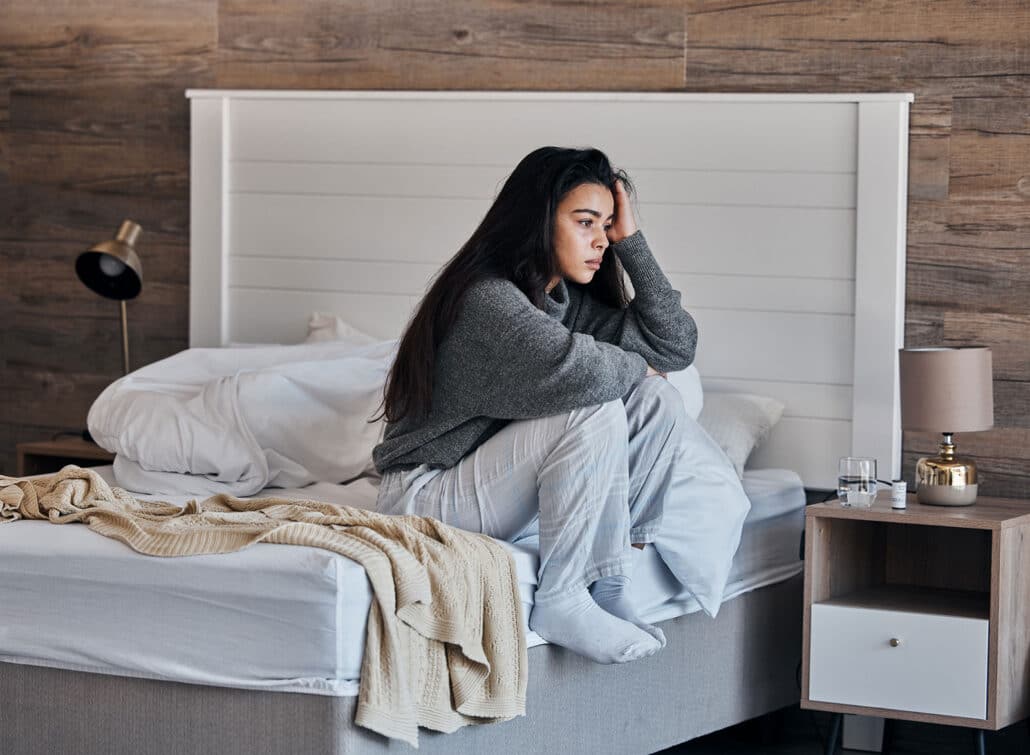Are you taking Seroquel or Quetiapine and wish to stop taking it? Seroquel is a prescription medication that is FDA approved to treat schizophrenia, acute manic episodes, and as an additional treatment for major depressive disorder. Over the years, it’s also been prescribed for many off-label uses, including insomnia, obsessive-compulsive disorder (OCD), Post Traumatic Stress Disorder (PTSD), and addiction and substance abuse treatment. While Seroquel is available only by prescription and is not considered addictive, a study in rodents by Chinese researchers found that it can cause psychological dependence. Stopping Seroquel suddenly can also cause many unwanted side effects and withdrawal symptoms, which is why getting help is essential if you want to week yourself off of Seroquel.

Table of Contents
Side Effects of Taking Seroquel
As part of your drug addiction treatment program, you may have been prescribed Seroquel, especially if you needed dual diagnosis treatment or were also found to have a mental health disorder along with your substance use disorder. While taking the medication, you may have noticed specific side effects, including:
- Abnormalities in Your Cholesterol Levels
- Being Constipated
- Dizziness or Vertigo
- Feeling Agitated
- Feeling Drowsy, Tired or Fatigued
- Having Dry Mouth
- Increased Appetite and Weight Gain
- Increased Blood Glucose Levels
- Increased Blood Pressure and Heart Rate
- Increased Frequency of Headaches
As you progressed further in your drug treatment program and continued using the medication, these side effects probably lessened as you continued your journey to sobriety, health, and wellness. Now, it’s pretty likely you feel well enough to stop taking your Seroquel. However, it is recommended that you get help to stop the medication.
Seroquel Withdrawal Symptoms
If you’ve completed your initial drug treatment program and been sober for a while, you may be thinking about stopping the Seroquel to rid yourself of the last reminder of your addiction. Unfortunately, when you stop taking Seroquel suddenly, you can experience mild to severe withdrawal symptoms. They include:
- Anxiety, Depression, and Agitation
- Dizziness
- Hypersensitivity to Sensory Perceptions (Light, Sound, Temperature, etc.)
- Increased Frequency and Severity of Headaches
- Increased Heart Rate
- Loss of Appetite
- Mania
- New Mental Health Issues
- Severe and Sudden Mood Swings
- Suicidal Ideation or Attempts
- Vomiting and Nausea
- Withdrawal Psychosis

Seroquel Withdrawal Timeline
Because of the severity and long list of withdrawal symptoms, it’s generally recommended to stop taking Seroquel by gradually lowering the dosage while under a doctor’s care so that your physical and mental health can be monitored. The Seroquel withdrawal symptom timeline is generally broken down into three primary phases: initial, rebound, and post-acute.
Initial Withdrawal
The initial withdrawal period for Seroquel starts within four days of stopping Seroquel and can last as long as six weeks or a month and a half. During this phase, you may experience:
- Aching and Pain in the Muscles
- Agitation and Anxiety
- Burning or Prickling Sensations Throughout Your Body
- Diarrhea or Loose Stools
- Dizziness
- Excessive Sweating
- Increased Blood Pressure and Heart Rate
- Involuntary Muscle Movements
- Loss of Appetite or Anorexia
- Nausea and Vomiting
- Trouble Sleeping to the Point of Insomnia
Disease Rebound Withdrawal
When stopping Central Nervous System (CNS) drugs, like anti-psychotics and antidepressants, you may experience a resurgence in the mental health symptoms you were experiencing before starting the medication. This is known as disease rebound and can occur simultaneously with the initial withdrawal symptoms or as a separate phase. There is no specific timeline for this phase of withdrawal. However, it’s a good idea to be medically supervised and have a detailed medical history so that the medical provider can determine if you are experiencing new symptoms or simply a resurgence of the symptoms you had before starting the medication.
Post-Acute Withdrawal Syndrome
Post-Acute Withdrawal Syndrome can last weeks or months after stopping the use of Seroquel. This is because medications like Seroquel cause changes in the brain’s neurotransmitters. During this phase, you may experience:
- Disturbed Sleep Patterns
- Increased Stress Sensitivity
- Irritability and Anxiety
- Obsessive-Compulsive Behaviors (OCD)
- Pessimism
- Trouble with Your Social Relationships
Coping with Seroquel Withdrawal
Seroquel can begin anywhere from 24 to 48 hours after you stop taking the medication. This is because Seroquel has a half-life of about six hours, meaning six hours after you take your last dose, and the amount of the drug is 50 percent less than it was when you took the medication. You’d have 25 percent of the medication in your system in another six hours. As the medication is naturally released from your body, you’ll start to feel withdrawal symptoms. To lessen those symptoms, most medical providers recommend gradually lowering the dosage over a period of weeks or months and having a medical provider monitor your progress and the frequency and severity of your withdrawal symptoms so that additional treatments can be tried to help reduce your discomfort.
- Make a plan to stop using Seroquel with help from your medical provider.
- Start weening off the medication by gradually lowering the dose.
- Discuss natural remedies to help with Seroquel withdrawal.
- Create a support network of family and friends that can help you through your withdrawal and recovery.
I’m not a doctor, but I can provide you with a general understanding of how Seroquel (quetiapine) tapering schedules are commonly structured. However, you should always consult with your healthcare provider before starting any tapering process, as they will tailor the schedule to your specific needs, condition, and response to the medication.

Example Tapering Schedule for Seroquel (Quetiapine):
This is a general example and may vary depending on your current dosage and how long you have been taking the medication.
For Higher Doses (e.g., 300 mg or More):
- Week 1–2: Reduce by 50 mg every 7–14 days (e.g., 300 mg → 250 mg → 200 mg)
- Week 3–4: Slow to 25 mg reductions every 7–14 days (e.g., 200 mg → 175 mg → 150 mg)
- Week 5–6: Once under 100 mg, reduce by 12.5 mg every 7–14 days (e.g., 100 mg → 87.5 mg → 75 mg)
- Week 7–8: Once at 50 mg or lower, reduce by 12.5 mg every 14 days (e.g., 50 mg → 37.5 mg → 25 mg → 12.5 mg → Stop)
For Lower Doses (e.g., 100 mg or Less):
- Week 1: 100 mg → 75 mg (reduce by 25 mg)
- Week 2: 75 mg → 50 mg (reduce by 25 mg)
- Week 3–4: 50 mg → 37.5 mg (reduce by 12.5 mg)
- Week 5–6: 37.5 mg → 25 mg (reduce by 12.5 mg)
- Week 7–8: 25 mg → 12.5 mg (reduce by 12.5 mg)
- Week 9–10: 12.5 mg every other day for 1–2 weeks, then stop
Important Notes:
- Go Slow at Low Doses: Withdrawal symptoms are often strongest at lower doses, so reduce slowly.
- Use Smaller Tablets or a Liquid Form: If available, liquid Seroquel can help with gradual reductions.
- Track Symptoms: Keep a journal of sleep, mood, and side effects.
- Communicate with Your Doctor: Adjustments may be necessary based on your body’s response.
Long-Term Treatment for Seroquel Dependency
The good news about the long-term treatment for Seroquel dependency is that you can use a lot of the skills and coping mechanisms you learned in your initial drug treatment program. This means that you’ll want to focus on your recovery, build your support network, take advantage of the resources and help offered by your medical provider and keep yourself busy with hobbies. Some ideas for a more holistic approach to breaking your Seroquel habit include:
- Using a little ginger (the spice or root) to help control nausea.
- Using natural sleep aides like melatonin and warm milk.
- Staying active by getting plenty of physical exercises or participating in a sport.
- Taking up yoga and meditation to help keep your mind clear and focused.
- Trying new hobbies, like painting, crafting, and horseback riding
- Staying hydrated and focusing on eating healthy so that your body gets all the micro and macronutrients it needs.
- Using acupuncture for muscle pain relief.
- Keeping a daily journal to record your symptoms, what you ate and how you feel as you progress through your treatment

Getting Help for Seroquel Dependency from Long Island Interventions
If you need help with a Seroquel dependency resulting from previous drug treatment, our caring and compassionate team at Long Island Interventions can help. We understand that you want to continue your recovery, clearing the medications given to you as a part of your medication-assisted detox treatment (MAT). We offer detox services, inpatient and outpatient treatment, and holistic treatments.
To get help, call us, use our live chat, or fill out our contact form. We are available 24 hours a day, seven days a week, to help you.
Published on: 2022-10-31
Updated on: 2025-05-05

